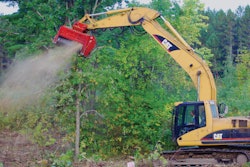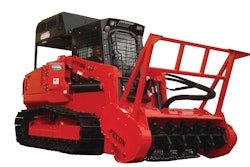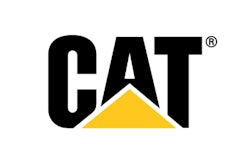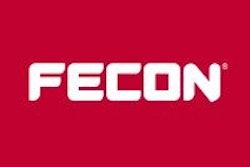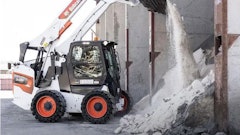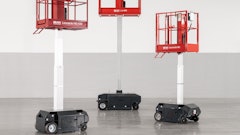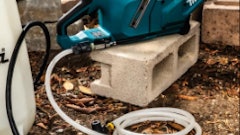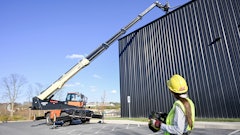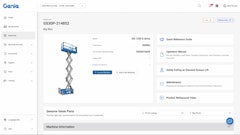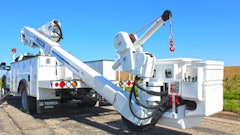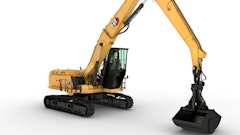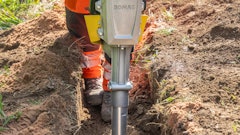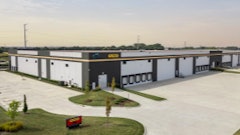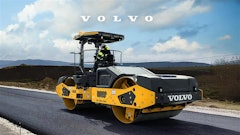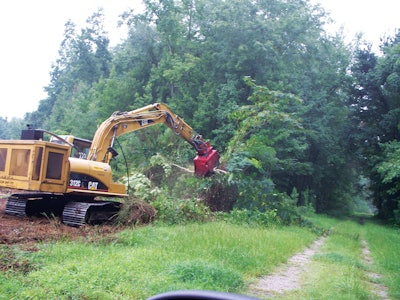
In talking with Dean Jones of BuzzCuts, a Snow Hill, NC, contractor, two sayings come to mind: "timing is everything" and "that which doesn't kill you makes you stronger." Both phrases are applicable to Jones' situation, but there is certainly nothing cliché in the lessons that he's learned over the past couple of years.
Jones is a land clearing contractor who has been in business for 12 years. In 2005, he bought a Bobcat T300 skid steer with a Fecon Bull Hog mulcher head, and started to develop a reputation for providing quality work at a reasonable price. He used that business model to build a business performing roadside clearing for the NC Department of Transportation.
While performing these projects, developers passing by would stop and ask about using the technology for lot clearing. Jones and his team stayed busy and times were pretty good. By 2008, his equipment arsenal had grown to a pair of Cat 287 skid steers (each fitted with Bull Hog mulcher head) and a Fecon FTX140 dedicated tracked mulcher.
Things were going so well that Jones continued to add equipment. "We'd heard from a customer that there was plenty of work, so we went ahead and purchased a new excavator and mulcher attachment," he notes.
In August of 2008, Jones placed an order for a Cat 312 excavator with a pony pack and a Fecon BH40 mulcher head, with delivery slated for mid-December. Then in early December, just two weeks before his equipment was due, he learned that the well had dried up. Due to belt tightening in a tough economy, funding for roadside clearing projects was gone. Even so, Jones took delivery of the equipment, and promptly began devising plans to try to keep it busy.
"The past couple years have been rough," says Jones, in what is perhaps the understatement of the year.
Farming for opportunities
With new equipment and some time on his hands, Jones set out to find new markets for his land clearing skills. While the majority of his past work had been for the NC DOT, nowadays he spends much of his time on the many farms that abound in the region.
He employs his two mulchers cleaning up field borders, clearing overgrown ditches and eliminating the piles of woody debris that farmers have accumulated over the years. Using the excavator to knock down large materials, which he then cleans up with the smaller, faster, more nimble FTX140, Jones cleans up the properties giving farmers better access to their fields and the water a clean pathway to flow in drainage ditches.
With the excavator-mounted mulcher attachment, Jones and the Buzzcuts crew had capabilities that they did not previously possess. Size of materials was no longer an obstacle. Jones tackles large-diameter wood by meticulously grinding away at it. "Once the materials are on the ground," says Jones, "we can do about anything with the excavator."
That is partly due to the power pack – an extra motor that drives the hydraulics powering the mulcher rotor. This arrangement is a little bulkier, but the excavator can apply all of its power to drive the tracks and maneuver the stick, while the mulcher head draws full power to attack brush, trees or organic materials. This makes it suited for grinding along fence rows, or clearing property lines, for example.
The excavator tackles the largest diameter materials and provides a first pass, while the FTX140 with a wider BullHog Mulcher head finishes the job.
"Customers appreciate the versatility of the pair" says Jones. "The excavator can handle any diameter wood, but the wider cutting swath of the 140 is faster and cheaper for the customer."
The excavator mulcher head has a working width of 37 inches. Buzzcuts crews top the trees with the excavator and then clean up the debris and smaller diameter materials with the tracked mulcher. This purpose-built machine has a mulcher head that boasts a working width of 85 inches. The pair is priced at just $375/hour with operators.
Providing lasting value
The tracts that Buzzcuts clears continue to provide value long after the crews have gone home. That's because these properties can now be maintained with traditional bush hog mowers. Since municipalities and landowners can perform their own cutting and roadside maintenance, this is naturally more cost effective than hiring out the projects.
As the shredded debris decays, it adds nutrients back into the soil, increasing its organic matter and aiding in moisture retention. The extra organic matter helps the grassy areas to grow without the use of fertilizers. Because the woody materials are mulched in place, the technology is less invasive and far less damaging to the ground than dozers and excavators would be. If there are "keeper" trees on site, the tracked mulcher can work around them without harming them or the terrain.
The equipment has also provided lasting value for Jones' business. Although there is very little DOT work in the near future, diversifying has helped Dean Jones to build a stronger company – and enabled Buzzcuts to "live to fight another day."




